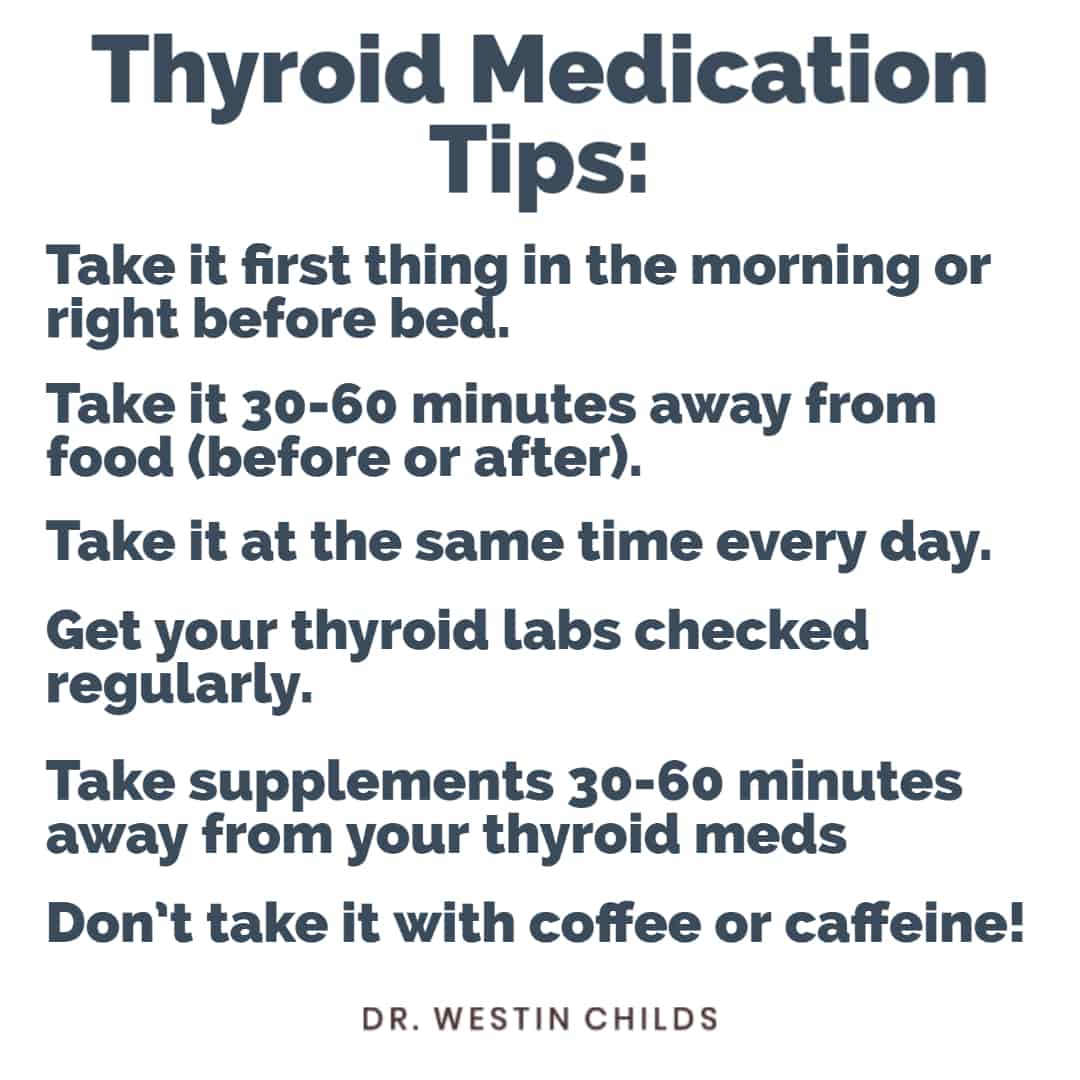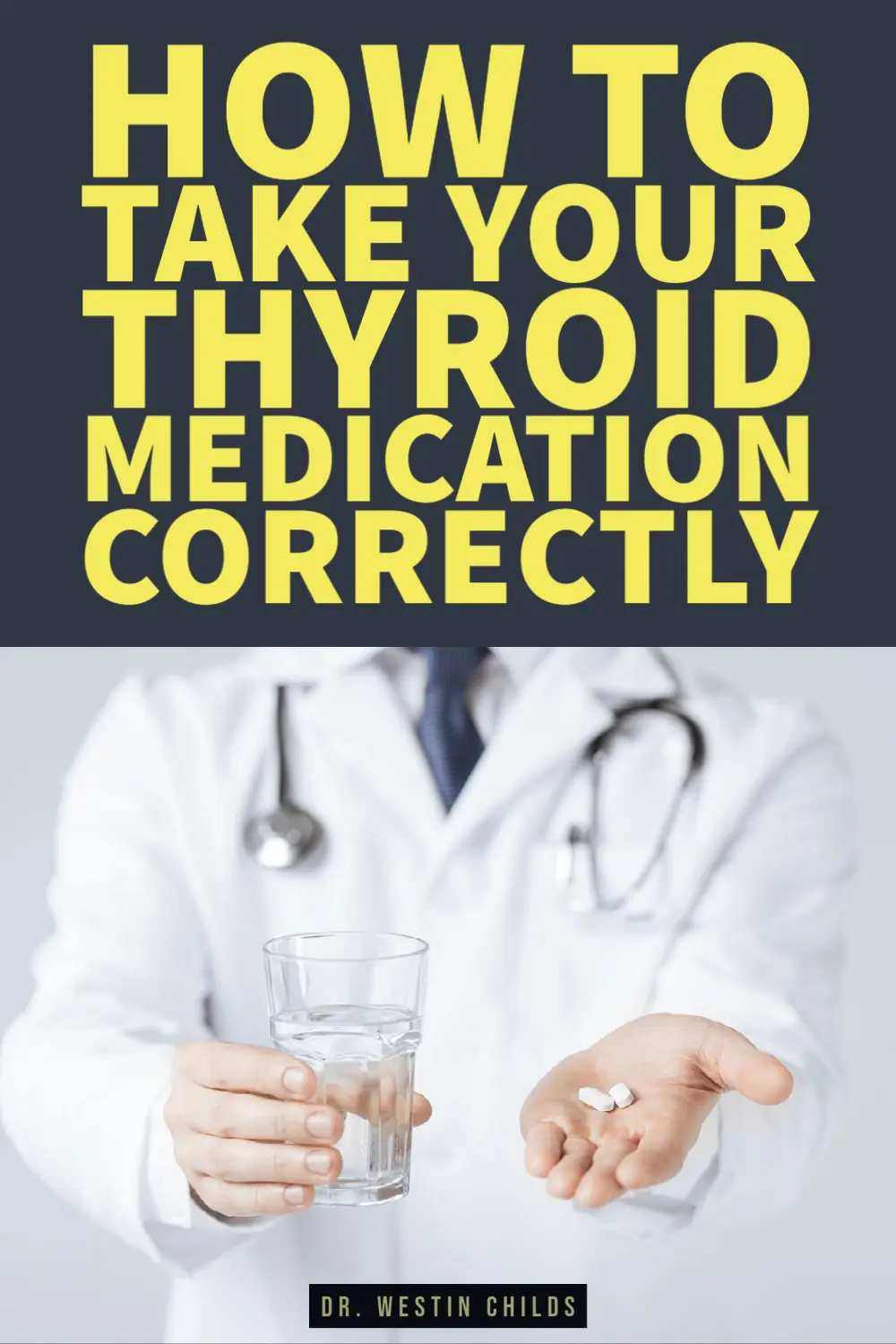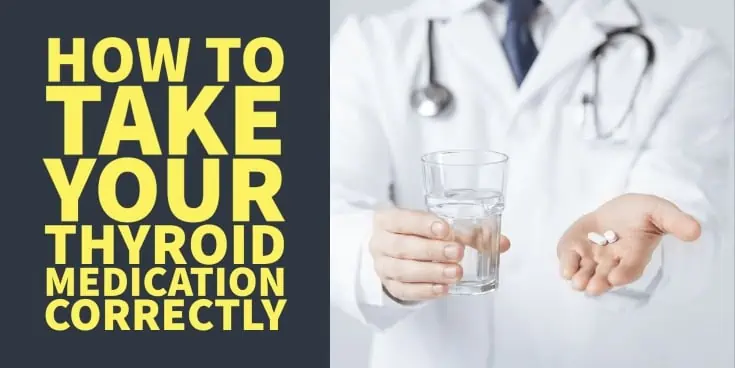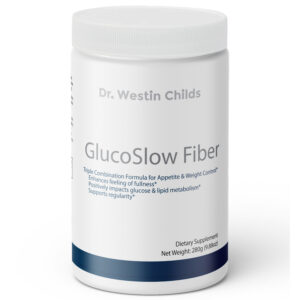Most Thyroid Patients Take Their Thyroid Medication Incorrectly
I’ve been helping thyroid patients for years and this is an issue that is far more prevalent than it should be.
What am I talking about?
I’m talking about how to take your thyroid medication.
I do understand why many thyroid patients get it wrong, though.
When you break down how to take your thyroid medication it can get complex rapidly.
But it doesn’t have to be.
Today we are going to talk about everything you need to know to ensure that you are taking your thyroid medication correctly.
Why is this important?
Well, if you aren’t taking it correctly then you have no idea whether it is working or not.
If you don’t take it correctly then you can’t blame your thyroid symptoms on anything else.
And if you were to take it correctly, you might find that you see an almost immediate improvement in your thyroid symptoms.
Taking your medication correctly ensures that the thyroid hormone that your body needs gets into your body from your gut which is no easy task as you will soon find out.
DOWNLOAD FREE RESOURCES
Foods to Avoid if you Have Thyroid Problems:
I’ve found that these 10 foods cause the most problems for thyroid patients. Learn which foods you should avoid if you have thyroid disease of any type.
The Complete List of Thyroid Lab tests:
The list includes optimal ranges, normal ranges, and the complete list of tests you need to diagnose and manage thyroid disease correctly!
Follow these Steps to Ensure You are Taking Your Medication the Right Way
Before we jump in, please note that there are a couple of things you should be aware of.
The first is that you MUST double-check your medication.
This may sound obvious but it is necessary!
You would be surprised at the number of people who are taking a different medication from what was prescribed by their doctor because it was either changed by the pharmacist or because it wasn’t covered by insurance.
Let me give you an example:
Imagine that your doctor is trying to give you Synthroid so he/she writes you a prescription for Synthroid.
You pick it up from the pharmacy and begin taking it.
After reading this article you look at your prescription and notice that it DOESN’T say Synthroid and instead is labeled as levothyroxine.
What gives?
Well, the pharmacy can change your medication without you knowing (1) if they believe that the medication is bioequivalent to another medication.
And pharmacists believe that both levothyroxine and Synthroid are the same thing.
Even though they contain the same active ingredient, how your body uses them can be completely different.
So make sure that you are actually taking the medication that was prescribed to you by double-checking your prescription bottle!
The second thing I want you to know is that the information you are about to read applies to ALL thyroid medications.
That includes medications like levothyroxine, Synthroid, formulations of NDT (natural desiccated thyroid), T3-only medications, and compounded T4/T3 medications.
So regardless of the medication you are taking, you will want to follow these guidelines.
Lastly, just do a quick double-check on your prescription bottle to make sure that your medication isn’t expired and that your dose is correct.
I’m serious. Go grab your prescription bottle and take a look at it.
Once you’ve done that, then you can proceed!
#1. Take your medication either first thing in the morning or right before you go to bed
When it comes to WHEN you take your thyroid medication you actually have a couple of options.
The first is either FIRST thing in the morning and the second is RIGHT before bed.
You’ve probably been told that you need to take your thyroid medication first thing in the morning before you have breakfast, right?
This is pretty standard advice given to all thyroid patients by doctors and pharmacists and for good reason.
The reason your doctor wants you to take your medication first thing in the morning is that by taking it then you will have a buffer between when you wake up and when you have breakfast.
Taking your thyroid medication away from food is a good thing (which we will talk about below) but there’s nothing magical about taking your medication first thing in the morning.
In fact, it may be the case that there is a benefit to taking it right before bed instead of first thing in the morning.

The reason for this isn’t exactly understood but we do know from medical studies that thyroid patients who take their thyroid medication in the evening experience better free thyroid hormone levels and TSH levels compared to those who take it in the morning.
This is probably because of gut function and how it differs in the morning versus in the evening.
In the morning your gut is more active which is why most people have a bowel movement when they wake up.
If your gut is more active then your thyroid medication will spend less time in the gut which will lead to less absorption.
If your medication is taken in the evening it will spend more time in the gut and, therefore, your body will absorb more of it as you sleep.
You can find what works best for you but I have seen many thyroid patients see significant improvement in their symptoms simply by changing what time of day they take their medication.
#2. Take your medication at least 30-60 minutes AWAY from food (either before or after)
Perhaps more important than WHEN you take your thyroid medication is how you take it.
This step is very important:
You must take your thyroid medication on an empty stomach which means at least 30-60 minutes away from food and drink.
You can take it before you eat or after you eat but just make sure that 30-60 minutes elapse in between these two events.
The reason you want to do this is that foods, nutrients, and vitamins can all interfere with the absorption of your thyroid medication.
You want to avoid any competition in absorption so that you can ensure as much hormone gets through your gut into your bloodstream.
What about drinks?
The best way to think about it is like this:
Make sure that you take your thyroid medication away from any liquid that has calories.
If it has calories and nutrients then these calories and nutrients may interfere with the absorption of your medication.
Taking your thyroid meds with water is fine but try not to take it with milk or orange juice or some other liquid that has calories.
#3. Take your medication at the same time each and every day – consistency is KEY
Another important element to getting the best results possible from your thyroid medication is consistency.
You should plan on taking your thyroid medication at the same time of day each and every day down to the minute.
The best way to ensure that this happens is to make it a part of your normal routine.
If you create a habit of taking your medication then you won’t forget it and you will ensure that you take it every single day.
One way to do this is by linking it to something else that you are already doing every day and have been doing for years.
Say, for example, brushing your teeth.
You’ve probably been brushing your teeth for 20+ years each and every day. If you create a routine where you sit your thyroid medication bottle right next to your toothbrush with a glass of water then you are unlikely to miss it.
And the chances are probably high that you are on a schedule and that you brush your teeth at pretty much the same time every single day.
Try linking your thyroid medication to something that you are already doing such as brushing your teeth, checking your phone, going to the bathroom, reading a book, making your morning coffee, or something similar.
Taking your thyroid medication in a consistent way will also ensure that your thyroid lab tests are accurate when they get checked which brings us to our next topic!
#4. Do get your thyroid labs checked regularly to see if adjustments in your medication are necessary
You should be aware as a thyroid patient that your thyroid medication dose may change over the course of your life.
One way to ensure that you are always taking the right dose of thyroid medication is to regularly get your thyroid labs tested.
This is true even for those people who are already feeling great on whatever dose they are taking!
Don’t fall into the trap of thinking that because you are feeling great that you don’t need to get your labs tested.
By regularly checking your thyroid labs you can be apprised of small and subtle changes in thyroid function that can be remedied before they become a big problem.

How frequently you need to get your thyroid labs checked depends on where you are at in treatment.
When you first get diagnosed with a thyroid problem you will want to check your thyroid tests every 6-8 weeks until you dial in your dose.
Once your dose has been stable for a period of time and your symptoms have resolved, you can push back how frequently you get your labs tested to something like 3-6 months.
If you’ve been stable for a long time then getting your labs checked every 6 months may be appropriate.
If at any point you feel that your symptoms are returning don’t hesitate to pull the trigger to get your labs retested!
Remember that things such as stress in your life, weight gain or weight loss, changes in your medical conditions, the addition or removal of prescription medications, and changes in your diet can all impact thyroid function and, therefore, your thyroid medication dose.
#5. Do NOT take supplements at the same time as your thyroid medication, take them at least 30-60 minutes away from whenever you take your thyroid meds
If you are like many thyroid patients out there then you are probably taking something to support your thyroid.
If you aren’t already then I would strongly recommend that you consider doing so because supplements can definitely help improve how you are feeling and how well your thyroid is functioning!
While taking thyroid supplements can be helpful for many people, they also have the potential to disrupt your thyroid medication.
For this reason, you will want to take your thyroid medication at least 30-60 minutes away from any over-the-counter supplements that you are also taking.
Do NOT take over-the-counter supplements at the same time as your thyroid medication.
Your doctor and pharmacist will probably tell you that you need to wait 4 hours before you take your thyroid medication if you are also taking supplements but this is rarely necessary.
It is necessary for two important supplements that we will talk about in just a minute but for most supplements, waiting 30-60 minutes is just fine.
I’ve had the opportunity to test this out on more than 45,000+ thyroid patients who have used my supplements in this way and we haven’t seen any issue using this time frame.
#6. If you are taking a dedicated calcium or iron supplement then make sure to take your thyroid medication 4 hours away from whenever you take these supplements
The 30-60 minute timeframe doesn’t apply, though, if you are taking an isolated and dedicated calcium supplement or an isolated and dedicated iron supplement.
Both iron and calcium have been shown to bind to and inactivate thyroid hormone (2) found in thyroid medication.
This isn’t an issue with absorption but rather an issue with binding between these two compounds.
For this reason, you will want to wait 4 hours to ensure that your thyroid medication doesn’t run into either of these compounds in your gut.
My experience suggests that the dose of calcium and iron matters which is why I specified an isolated and dedicated version of both in my above comments.
In other words, if you are taking an iron supplement because you are iron deficient then you will want to wait 4 hours before you take your thyroid medication.
If, however, you are taking a small amount of iron in something like a multivitamin then the length of time that you need to wait doesn’t need to be the full 4 hours.
Most people are fine waiting 30-60 minutes when using low doses of calcium and iron, such as those doses found in multivitamins, without any issue.
As always, your mileage may vary, though, so don’t be afraid to wait longer if you feel that you are having issues!
#7. Do NOT take your thyroid medication with coffee or caffeine
If you are someone who takes their thyroid medication first thing in the morning then you need to make sure you do not take it anywhere near coffee or caffeine.
Not only does coffee have a suppressive effect on thyroid function (3), but it also increases your intestinal tract which can influence thyroid medication absorption in a negative way.
This is true of anything that contains caffeine, by the way!
Including things like caffeinated teas, decaf coffee, energy drinks, sodas, and more.
It’s best to avoid coffee if you have a thyroid problem but there are some people who insist that they need it.
If you are one of those people then you should try to take your thyroid medication in the evening to avoid interference with your coffee.
If taking your thyroid medication in the evening isn’t possible then you will want to take your thyroid medication before your coffee.
Even though this isn’t the best option it’s still better than taking it after you have your morning cup of coffee.
#8. Remember that not all thyroid medications are created equal – switch to a thyroid medication that has fewer fillers if necessary
It’s important to remember that not all thyroid medications are created equal.
Your doctor may try to tell you that there is no difference between Synthroid and levothyroxine and while that is true from the perspective of active ingredients, it’s not true from the perspective of how well your body may tolerate it.
If you find that, despite your best efforts, you just aren’t feeling well on a certain type of thyroid medication then don’t be afraid to switch to a different type, even if it’s within the same family.
Using the example above, if you are taking levothyroxine and not feeling well then give Synthroid a try.
Even at the same dosing, you might be surprised at how different you feel just by switching your medication.
This effect exists for all thyroid medications and has to do with the inactive ingredients found in various types of thyroid medications.
These fillers can cause reactions themselves, interfere with absorption, and seem to cause other issues for certain thyroid patients.
This switching doesn’t just work with Synthroid to levothyroxine, though.
It can be used for ALL types of thyroid medications.
I’ve included a list of the 3 main families of thyroid medications below with options that you can swap to if necessary.
Thyroid medications found within the same family include:
- Thyroid medications in the T4 family – Levothyroxine, Synthroid, Tirosint, Tirosint-sol, Levoxyl, Euthyrox, Unithroid, Levo-T, and Levothroid
- Thyroid medications in the NDT family – Nature-throid, Armour Thyroid, NP Thyroid, WP thyroid, and Thyrolar.
- Thyroid medications in the T3 family – Liothyronine, Cytomel, and Sustained Release T3.
You should also be aware that some thyroid medications are just naturally cleaner than other medications due to their inactive fillers.
The cleanest thyroid medications on the market include:
- Tirosint (3 inactive ingredients)
- Tirosint-sol (2 inactive ingredients)
- WP thyroid (3 inactive ingredients)
#9. Make adjustments to your thyroid medication if you become pregnant
This section is really only important if you are a female but it’s worth mentioning!
If you become pregnant then you need to immediately increase how much thyroid hormone you are taking.
Here’s why:
When you take thyroid medication your own natural production of thyroid hormone is suppressed as your medication takes over what your body should be producing.
This works out fine if your dose stays relatively stable but becomes a problem when you have a sudden increased demand for thyroid hormone in your body because your body can’t produce more thyroid hormone to meet that demand.
Instead of counting on your thyroid gland to produce more thyroid hormone, you must meet that demand by increasing your thyroid hormone in your thyroid medication.
Pregnant women have a big increased demand for thyroid hormone because of their developing child.
The developing child needs thyroid hormone for proper development, especially in the nervous system and brain.
For this reason, you need to be prepared to increase your dose of thyroid medication the day you find out that you are pregnant.
How much you need to increase will vary based on what type of medication you are using and how your labs look but be prepared for a 20% increase all the way up to a 100% increase in your dose.
Optimal TSH levels for pregnant women are different from those of the general population as well so don’t be afraid of taking more thyroid hormone if you are pregnant.
#10. Do check to make sure your other prescription medications are not interfering with your thyroid medication
Another area that may cause issues with your thyroid medication is other prescription medications that you may be taking for other issues.
Thyroid patients tend to have other medical conditions, especially things like depression, anxiety, insulin resistance, high blood pressure, and high cholesterol.
If you are seeing a doctor regularly and getting these things checked, then chances are probably high that you are taking other prescription medications in addition to your thyroid medication.
What you may not know, though, is that some of these medications are notorious for causing thyroid problems either because they can interfere with your thyroid medication OR because they can interfere with thyroid function.
Imagine taking a prescription medication like an anti-depressant only to find out that your other medication is causing problems with your thyroid medication.
The problem might not be your thyroid medication but instead, something else that you are taking!
And don’t count on your doctor to know all of these interactions.
I’ve spent a lot of time researching to find these interactions and many of them were a complete surprise to me. With the sheer number of prescription medications available on the market, it’s not really possible to have a complete understanding of how they all interact with one another.
But you don’t have to worry about that because I’ve created a list of medications that can cause thyroid issues.
Check it out below:
- Acid blockers – Acid blockers can interfere with thyroid medication absorption and include medications like proton pump inhibitors and H2 blockers (4). These are commonly used for acid reflux and are available over the counter.
- Anti-depressants – Anti-depressants, especially SSRIs (5), can interfere with your thyroid medication effectiveness. If you are on an SSRI then you may need to up your dose of thyroid medication.
- Birth control pills – Birth control pills impact something called SHBG (6) (sex hormone binding globulin) and can impact how available thyroid hormone is in your body by binding to it.
- Diabetes medications – Diabetes medications, especially metformin (7), can impact your TSH levels. If you are taking diabetic medication make sure to keep an eye on your TSH and free thyroid hormone levels.
- Narcotics – Narcotics (8), of all types, have a tendency to suppress thyroid function from the brain. This can artificially lower your TSH and make it look like you are getting enough thyroid hormone when you really aren’t.
- Beta-blockers and other blood pressure medications – Blood pressure medications, especially beta-blockers, can block thyroid hormone function in your peripheral tissues. Some of these medications are used to treat hyperthyroidism (9)!
- Cholesterol binders – Some types of cholesterol medications work by binding cholesterol in your GI tract. These binders can also bind up thyroid hormone medication and reduce absorption.
- Antacids – Antacids (10) can block thyroid medication absorption much like acid blockers.
If you are taking any of these medications then make sure to talk to your doctor about other alternatives!
Switching from a medication that negatively impacts your thyroid may improve your overall health as you improve thyroid function.
Remember:
Your thyroid helps to control and regulate important systems like your cholesterol.
As you improve your thyroid hormone you might find that you really don’t need your cholesterol medication after all!
#11. Be aware that medical conditions can also impact your thyroid medication.
Not only can your medications impact your thyroid medication but your health problems can as well!
Certain medical conditions, especially those in the gut, create a scenario in which absorbing your thyroid medication will be very difficult.
Some conditions which may impact your thyroid medication include:
- Celiac disease (11)
- Non-celiac gluten sensitivity
- H. pylori infection (12)
- Gastritis
- Malabsorption syndromes
- Autoimmune gastritis (13)
- Liver disease (fatty liver, alcoholic liver damage, and infection-related liver damage)
- Lactose intolerance (14)
You will notice that most of these diseases originate and cause problems in the gut but some cause problems in other organs which are important for thyroid function.
One such organ is the liver.
Your liver is responsible for the majority of T3 production, via thyroid conversion, floating around in your body.
Any damage to the liver may slow down this process and, therefore, cause thyroid problems.
Nowadays, obesity is one of the most common causes of liver dysfunction! So if you are overweight make sure you check on your liver function tests.
Treating or managing these conditions may indirectly improve your thyroid function as well as how effective your thyroid medication can be.
Wrapping it up
This may seem like a long and complex topic but it’s so important for thyroid patients to understand!
There are many levels at which your thyroid medication can be negatively impacted and each of these may result in persistent hypothyroid symptoms even though you are taking your medication faithfully.
Please spend some time on this article and figure out which areas you can improve upon.
As you make changes to your lifestyle, when you take your thyroid medication, and other areas, you should see an improvement in how you are feeling.
And that’s really what’s most important. How you feel.
The whole point of doing these things is to help YOU feel better!
Now I want to hear from you:
Were you aware of these things that can impact your thyroid medication?
Did any come as a surprise to you?
Or are you a thyroid savant and nothing surprised you? 🙂
Are you planning on making any changes to help improve your thyroid medication?
Let me know in the comments below!











